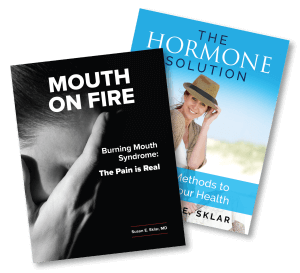Sexual Health for Men and Women
We at the Sklar Center are all about achieving your optimal health: your optimal brain health, your optimal body health, and your optimal sexual health.
What is Sexual Health?
First, what is sexual health? Sex blogs can be about many things. This blog post is not going to deal with kinky stuff or people with sexual abnormalities. Our goal here is to speak to the mainstream, and share the kinds of sexual issues we hear about all the time at the Sklar Center.
We have found is that the essence of sexual health is communication. communication is the path to intimacy
What we have found is that the essence of sexual health is communication. Communication is the path to intimacy — something that you and your partner need to work on. Of course, there is sex without intimacy and communication – one-night stands and all that stuff. But we’re not talking about that. We’re talking about sex as an expression of how you feel about somebody. Because that really is what leads to sexual wellness and relationship satisfaction.
When Sexual Health is in Danger
Here are examples of some stories about sexual health problems we’ve heard over the years:
The typical patient is in her late thirties. She’s been married for 15 years and has three kids. But her sex life has taken a nosedive. Although her husband is interested, he is really stressing. Why? Because he’s having some sexual function problems himself. And when she comes to see us, she’s says “What am I going to do? I’m in a marriage, but I really could care less if I ever have sex again.” But we know that lack of intimacy can spell doom for a marriage.
Menopause: You don’t have enough estrogen to maintain vaginal tissues. This leads to dryness and painful sex
What about women closer to menopause? One patient we saw had started the menopause transition and decided she was going to take the natural route. It worked out at first. And It usually does for a year or even two after women have had their last menstrual period. The vaginal tissues and are still healthy, but then that changes, because you don’t have enough estrogen to maintain those tissues. This leads to vaginal dryness and painful sex.
Six months ago, she started using some lubricating jelly for sex because of feeling dry. Then after a while lubrication didn’t work. Sex gets so painful it feels like there’s sandpaper rubbing against her insides because of dryness. She wonders if she’ll ever be able to have sex again (and so does her partner).
Sexual Health Problems are Fixable
We see lots of women like these and their problems are fixable. Usually people give a sigh of relief when we tell them it’s completely reversible.
Here are some of the common things we see:
- loss of desire
- trouble getting aroused
- vaginal dryness and pain
Loss of desire means not thinking about sex or not wanting it. For example, many women have sex just to satisfy their partners, but it feels like a chore instead of an enjoyable activity.
Arousal difficulty means having trouble getting sexually excited on the way to having an orgasm. This may prevent orgasms or diminish their intensity.
Pain and dryness interfere with all phases of sexual activity—desire, arousal and orgasm. If a woman cannot enjoy sex because of dryness and pain, she will avoid sexual intimacy because it hurts.
Many Things Can Affect Sexual Health
Hormones
By the time somebody is 38 or 40, some of their hormones are half of what they were earlier in life. Some of the hormones that affect your sex life at this stage of life are testosterone and DHEA. Later, in your forties and on to the fifties, the lack of estrogen for women has profound effects on sexual health. For instance, during the first year in menopause women lose 80% of their estrogen.[1] So, your desire for sex, the ability to get aroused and the health of your vaginal linings are all under the influence of estrogen.
Testosterone levels dwindle with age but at menopause the level is only 15% of your youthful level.[1] Testosterone for men, as well as women, is involved in desire for sex and sexual functioning.
One thing that many women — and even doctors – don’t know is that women actually have testosterone receptors in the clitoris and vulva area. That means applying testosterone cream directly to your clitoris and vulva has profound effects. Therefore, women who have arousal and orgasm problems may see significant benefits using testosterone cream in this way.
The other thing that happens with diminishing estrogen is that there is less blood flow to the genital area, and arousal and sensitivity depend on those tissues getting engorged, just like a man’s penis gets erect. Women’s tissues become engorged with blood and get firm and erect, and that makes the parts more sensitive to touch and more able to have orgasms.
Aging
Other things also affect sexual health. As people get older, they get chronic diseases like high blood pressure and diabetes. These diseases affect blood vessels. We know that diabetics have a higher incidence of strokes and heart attacks because they have plaque in their arteries.[2]
Men who have plaque in their arteries can have erectile problems because they rely on healthy, open arteries for blood to flow into the penis. And women rely on healthy arteries for blood flow into the genital area, so that they can become aroused and have orgasms.
Medications
Many common medications can affect sexual health. Oral contraceptives sometimes suppress sexual desire. In addition, these medications can also cause vaginal thinning and painful sex. Oddly enough, just the medication that can provide sexual freedom can also block sexual desire.
Being on medications can present a problem sexually. Your doctor can adjust your medications to one that does not cause sexual side effects
Antidepressants have a well-known effect on lowering desire for sex and inhibiting orgasmic function. Other medications known to affect sexual desire include anti-anxiety drugs such as Xanax and Valium, blood pressure drugs, diuretics, and certain heartburn medications.[3]
Being on medication can really present a problem sexually. Many times, your doctor can adjust your medications by lowering the dose or changing your medication to one that does not cause sexual health side effects.
Gynecologic Surgery
Sometimes after surgery, specifically hysterectomy, women notice a change in their sex lives. Surgeons should present this possibility to women as part of their review of surgery risks and complications. Women should seriously consider these possible effects of surgery.
A few years ago, surgeons tried supracervical hysterectomies. The idea was to remove the uterus and leave the cervix in place. The intent was to preserve sexual function, but this didn’t really pan out.[4] Even with leaving the cervix behind, the surgery can affect the nerves that go to the vaginal and genital area. This can cause decreased sensation and decreased ability for orgasms. So women should question whether there are options besides surgery.
Low Self Esteem Affects Women’s Sexual Health
There are other things that affect sexual health — such as self-esteem. Women are very complex when it comes to their sexuality. How a woman feels about her body will affect her sexual health.
For example, many guys can look in the mirror at their big belly and say “Huh, I look pretty good.” On the other hand, women say, “Oh my butt’s so big” and “I don’t think I’m as attractive as I used to be.” Self-image affects sexuality and sexual health for women.
Stress
There is another typical situation that happens to mid-life women. Often women must care for elderly parents while still having teenagers around who need a lot of attention. These women are part of the sandwich generation. However, these women must also remember their marriages and pay attention to their partners. An important part of marriage and love relationships is intimacy. But the sandwich generation women are often too exhausted at the end of the day. And having sex is the last thing that they want to think about – they’re too tired.
How Do you Know You Have a Problem?
Everyone wants to know what’s normal and what’s not. The question is how do you know if you might have a problem?
“Normal” in sexual health is very, very broad. So, the question is: when is it not normal? Or, when should you do something about it?
Maybe the sex doesn’t feel good anymore. It used to feel good. Or, you have pain and you have difficulty getting excited or aroused. Maybe, you find your relationship lacks intimacy and the closeness you desire. These are indicators of a problem and the need to get help.
Other Influences on Sexual Health: Fatigue, Relationship Problems, Cultural and Religious Messages
Here are some other things can affect sexual health. First off, the physiological things: these are fatigue, loss of hormones, and interfering medications.
Then there are the psychological issues: depression and anxiety can cause you not to want to have sex. Moreover, a history of prior sexual or physical abuse can certainly affect your sexual health.
Also, alcohol and other types of drug abuse can affect your sexual health.
What about interpersonal relationships? If you hate your spouse, you are not going to want to have sex with them. It’s a no brainer.
In addition, there is lack of privacy. I hear about that often. There are couples whose young children can march into the bedroom at any time. In these cases, there is lack of boundaries. If you’re in that situation, you may have difficulty finding private time and a place to have sex. You may have to delay relations until you’re somewhere where your kids can’t just pop it on you. Setting boundaries is essential.
Scandinavian countries educate students about healthy intimate relationships. In America, a legacy of Puritanism and religious fundamentalism are barriers to understanding intimate relations
Socio-cultural influences affect how you think about sexual health. Some are religious or societal taboos. There are societies and cultures in which women aren’t supposed to touch themselves. This means women’s orgasms or masturbation are taboo. Moreover, in some societies the whole clitoris and small vaginal lips are cut off to prevent women from having pleasure from sex.
Sometimes, there is simply a lack of education. Although there is sex education in public schools, it primarily addresses sexually transmitted infections and birth control. School sex education certainly doesn’t cover the issue of sexuality and intimacy. Scandinavian countries educate students about healthy intimate relationships. In America, a legacy of Puritanism and religious fundamentalism are barriers to education about sexual health and understanding intimate relations.
There are Solutions to Achieving Sexual Health
For men, the solutions are often simple. For some men with low testosterone the solution is testosterone replacement therapy. The other problem in men is what we call a plumbing issue. This means low blood flow to the arteries of the penis prevents erections. Restoring testosterone, evaluating the arterial system and using medications like Viagra can solve these problems for men.
Hormone Balancing in Women
For women, hormone balancing solves many sexual and mood problems. At the Sklar Center we use only bioidentical hormones which have the exact same chemical structure as your own hormones. This means they are safer and have fewer side effects than non-bioidentical and synthesized hormones.
Bioidentical forms of estrogen help your libido and vaginal dryness. For example, bioidentical testosterone helps libido, arousal and orgasms. In addition, bioidentical DHEA is another hormone that helps with libido in both men and women. These hormones are safe and have worked well for women and men.[5]
Herbal Remedies
There are also herbal remedies that can improve sexual health. Zestra® is a lubricant that also contains herbs and essential oils to help sexual function. In scientific studies, women using Zestra® showed an increase in libido and arousal. (They don’t pay us to say this, we just think it’s a good product.)
In addition, herbal oral supplements are available, which only work so-so. They don’t work as well as hormones, but they work somewhat for some people. These supplements contain herbs like horney goatweed, tribulus, and tongkat ali.
If you have questions or problems with sexual function, early symptoms of menopause or menopause, you’ve come to the right place. Dr. Sklar is an expert in helping you reach sexual health. She has been actively involved in national and international sexual health organizations. The Sklar Center will get to the root of your problems, balance your hormones, and guide you to fulfilling and satisfying sexual health.
If you would like more information or are considering a personal evaluation at the Sklar Center, give us a call today at 562-596-5196 to request a consultation.
References
- Astrid M. Horstman, E. Lichar Dillon, Randall J. Urban, Melinda Sheffield-Moore
The Role of Androgens and Estrogens on Healthy Aging and Longevity
The Journals of Gerontology: Series A. Volume 67, Issue 11, November 2012, Pages 1140–1152.
LINK: The Role of Androgens and Estrogens on Healthy Aging and Longevity - Maric-Bilkan C
Sex differences in micro- and macro-vascular complications of diabetes mellitus
Clin Sci (Lond). 2017 May 1;131(9):833-846. doi: 10.1042/CS20160998.
LINK: Sex differences in micro- and macro-vascular complications of diabetes mellitus - BY OBOS SEXUALITY & RELATIONSHIPS CONTRIBUTORS
Medications That Can Affect Sexual Desire and Pleasure
Our Bodies Ourselves. OCTOBER 15, 2011 LAST REVISED ON JUL 8, 2014.
LINK: Medications That Can Affect Sexual Desire and Pleasure - Radosa JC, Meyberg-Solomayer G, Kastl C, Radosa CG, Mavrova R, Gräber S, Baum S, Radosa MP
Influences of different hysterectomy techniques on patients’ postoperative sexual function and quality of life
J Sex Med. 2014 Sep;11(9):2342-50. doi: 10.1111/jsm.12623. Epub 2014 Jul 10.
LINK: Influences of different hysterectomy techniques on patients’ postoperative sexual function and quality of life - Maurand Cappelletti and Kim Wallen
Increasing women’s sexual desire: The comparative effectiveness of estrogens and androgens
Horm Behav. 2016 Feb; 78: 178–193.
LINK: Increasing women’s sexual desire: The comparative effectiveness of estrogens and androgens
Download Your Free eBook




